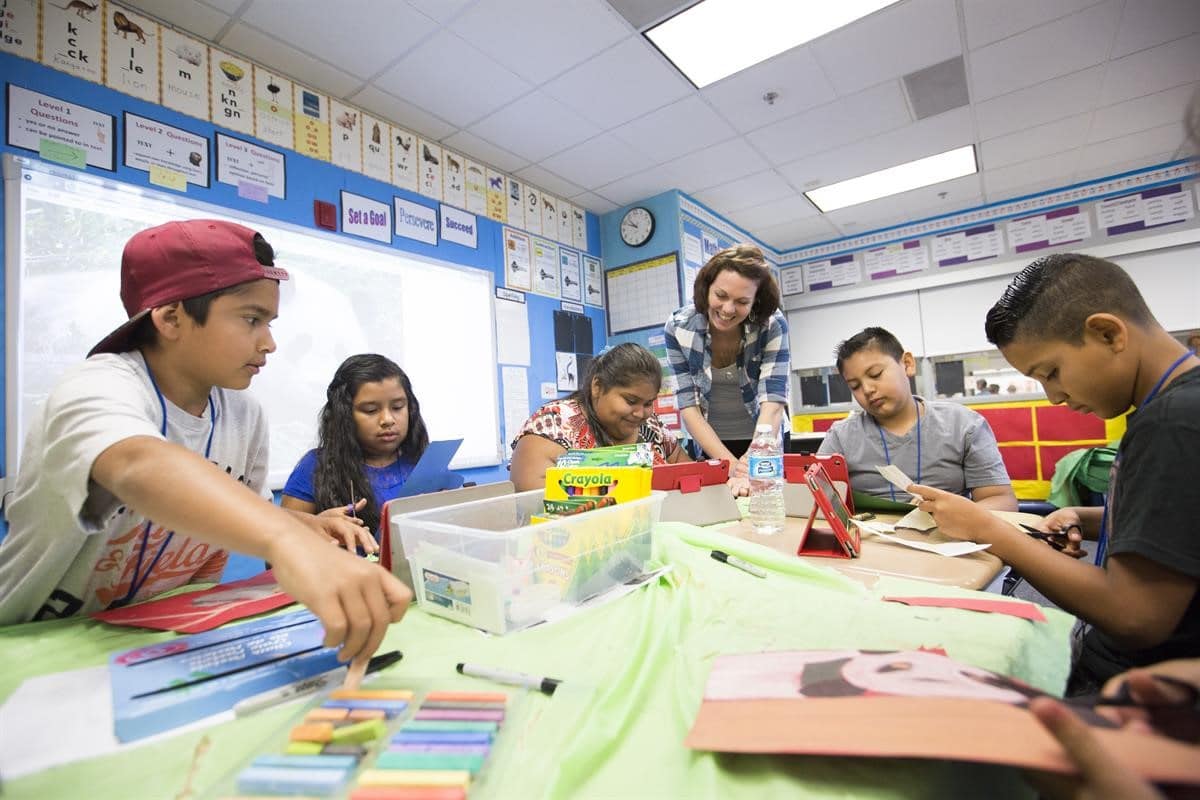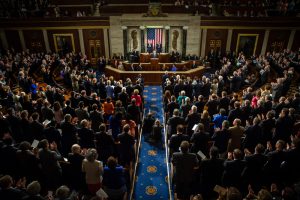01 Nov2019
By Jane E. West

This blog post is written by AACTE consultant Jane West and is intended to provide update information. The views expressed in this post do not necessarily reflect the views of AACTE.
It’s been quite a week in DC. The most impressive news is having our home team—the Nationals—win the World Series, despite their substantial underdog status. Other than that, the House voted to proceed officially with the impeachment process on a totally partisan basis—and that promises to suck the oxygen out of any sort of Congressional agenda for months.
Are we Headed to a Government Shutdown … Again?
While the Senate made progress on funding bills this week, big hurdles remain. The Senate passed a package of four appropriations bill with a bipartisan vote of 84-9, the first funding bills to pass the Senate. However, Senate Democrats blocked movement on the package of two large spending bills: Defense and Labor/HHS/Education. They are not happy that President Trump is insisting on funding for his border wall and that the Labor/HHS/Education bill’s spending level is so low.
29 Oct2019
By Jane E. West
 This blog post is written by AACTE consultant Jane West and is intended to provide update information. The views expressed in this post do not necessarily reflect the views of AACTE.
This blog post is written by AACTE consultant Jane West and is intended to provide update information. The views expressed in this post do not necessarily reflect the views of AACTE.
Funding Bills Move in the Senate, but Not for Education
November 21, less than a month away, is the date the government runs out of money. The ball is in the Senate court, as they have yet to pass any appropriations bills on the floor. Majority Leader McConnell (R-KY) has teed up passage of the first package of funding bills, which Democrats have said they will support. But that package does not include education spending, which is in the Labor/HHS/Education appropriations bill.
29 Oct2019
By Deborah Koolbeck
 Registration is open for the AACTE member exclusive October 2019 Federal Update webinars. AACTE offers these webinars to you on two different days of the week and at two different times to accommodate members’ teaching schedules and time zones.
Registration is open for the AACTE member exclusive October 2019 Federal Update webinars. AACTE offers these webinars to you on two different days of the week and at two different times to accommodate members’ teaching schedules and time zones.
Even though one might expect activities to slow down in Washington as the year begins to wind down, plenty is happening that impacts the profession. On October 15, Chairman Scott (D-VA) of the U.S. House of Representatives Committee on Education and Labor revealed his proposal for reauthorizing the Higher Education Act. What does it look like for educator preparation? Will Chairman Alexander (R-TN) move his bill through the U.S. Senate Committee on Health, Education, Labor, and Pensions? And not to be forgotten is the appropriations process—as the Congress heads toward a November 21 deadline for funding the federal government, what is the outlook? Will there be another short-term Continuing Resolution (CR), or could we see even a year-long CR? Could a government shutdown happen? This webinar will cover these topics, as well as the advocacy steps that you can take to engage in the process, and there will be a Q & A session for you to get your answers to your questions. Register today!
Tuesday, October 29, 2019, 5:00-6:00 p.m. EDT: Register now.
Wednesday, October 30, 2019 11:00 am-12:00 noon EDT: Register now
25 Oct2019
By Beth Day
The U.S. Department of Education has awarded the Southern Regional Education Board a $5.3 million, 5-year Teacher Quality Partnership grant to create a residency-based teacher preparation program with Georgia College & State University.
The Georgia Residency for Educating Amazing Teachers will recruit undergraduate STEM majors who aspire to become middle grades math and science teachers. They will complete an online Master of Arts in Teaching during a year-long residency—practice teaching supervised by a mentor-teacher— in a high-needs middle grades classroom.
Rural school districts served by the Oconee Regional Education Service Agency in central Georgia will be the primary partners for hosting the residents in classrooms. SREB and Georgia College will support mentor-teachers and residents with coaching and specialized training on topics like project-based learning.
Over the course of the grant, 60 students will become fully certified to teach middle grades math or science in Georgia; some will also complete a computer science endorsement.
The newly certified teachers will then teach in a local school for two years with support from mentor-teachers and SREB instructional coaches. Participants agree to teach in their assigned schools for one year beyond this two-year induction period.
22 Oct2019
By Deborah Koolbeck
The Problem

As educators, protecting and nurturing the health and well-being of our nation’s most precious investment—our youth—is always top of mind. Safeguarding their welfare and creating supportive learning ecosystems should be national priorities. Unfortunately, no one piece of legislation, no one initiative, no one activist, or caring teacher can bring that umbrella of safety to every student, everywhere, all the time. What we need to be talking about openly and often across the nation is prevention: training, learning, and preparing. This begins at the federal level with funding to equip our state and local leaders with the tools necessary to create and foster a safe and balanced learning environment for all students.
There are classrooms and schools in this country where teachers are armed with weapons. It is a dark reality, and one that AACTE does not support. Federal funds should not be used to arm teachers. Funds should instead be used to incentivize building learning communities through supportive training in social and emotional learning, and to prepare profession-ready teachers. Federal money
22 Oct2019
By Jane E. West

This blog post is written by AACTE consultant Jane West and is intended to provide update information. The views expressed in this post do not necessarily reflect the views of AACTE.
November 21 Deadline Looming to Fund the Government: Will Congress Act?
Just before Congress left town for their 2-week recess, they passed a short-term funding bill to keep the government open, but only until November 21. As that deadline comes closer, the pressure to act increases. The ball is in the Senate’s court, as the House has passed 10 of its 12 funding bills.
The Senate is planning to move bills next week, but hot-button issues related to the border wall, homeland security, and abortion will likely crop up, as well as significant funding level differences between the House and the Senate that will likely hold things up.
Possible outcomes include another short-term spending extension (perhaps through December),
18 Oct2019
By Toni Molle

Photo: Courtesy of The California State University
This article and photo originally appeared on The California State University website and are reprinted with permission.
Three California State University (CSU) campuses were awarded nearly $3 million from the U.S. Department of Education’s Teacher Quality Partnership (TQP) program to recruit and prepare science, technology, engineering, mathematics (STEM) and computer science teachers to serve students in low-income and high-need schools throughout the state. California State University campuses in Chico ($1,027,195), Dominguez Hills ($1,028,844) and Monterey Bay ($811,719) have received a total of $2,867,758 in funding for the program.
“Collaboration is a key component among educators,” said Marquita Grenot-Scheyer, assistant vice chancellor for Educator Preparation at the CSU Chancellor’s Office. “By expanding the ongoing collaborative partnerships between the CSU and high-need school districts and through development of engaging STEM and computer science programs, more students will succeed in the classroom.”
18 Oct2019
By Anne Cantrell

Photo by Adrian Sanchez-Gonzalez
This article and photo originally appeared on the Montana State University website and are reprinted with permission.
Montana State University’s Department of Education and its partners have received funding totaling $6.2 million for a program delivered mostly online that is designed to recruit, train and mentor dozens of high-quality educators to work in rural areas of Montana.
The funds include a $3.1 million grant from the U.S. Department of Education and more than $3.1 million in matching funds and services from nearly a dozen partner organizations. They will be used for a five-year project, “Addressing Rural Recruitment and Retention in Montana,” that aims to address a shortage of teachers in rural locations across the state.
“We are excited to provide training and professional development in the first two years of their teaching careers to residents of rural, high-needs communities along with the Montana Office of Public Instruction and our many statewide partners,” said MSU education professor Ann Ewbank, the project’s principal investigator.
“Our common goal is to ensure that every student, from Broadus to Lolo, and from Scobey to Troy, has access to highly effective educators,” Ewbank added. “The Teacher Quality Partnership grant has the potential to strengthen K-12 education in rural communities. When rural schools thrive, Montana thrives.”
17 Oct2019
By Robert Whitby
This article originally appeared on the University Of Arkansas website and is reprinted with permission.
Across the country, there’s a critical need for teachers who know how to use evidence-based practices to improve the adult outcomes of students with disabilities.
The University of Arkansas and University of Oklahoma have partnered to help meet that need with a unique program called Razorback-Sooner Scholars: Leaders for Transition.
Leaders for Transition will provide a unique, funded doctoral experience for 10 students at the two universities who want to be special education assistant professors interested in transition services for youth with disabilities and their families.
Recently, the universities were awarded a $2.4 million grant from the U.S. Department of Education, Office of Special Education Programs to fund the program.
11 Oct2019
By AACTE
The American Association of Colleges for Teacher Education (AACTE) celebrates its 20 member institutions that received the 2019 Teacher Quality Partnership (TQP) grants from the U.S. Department of Education announced last week. With grants totaling more than $20 million, the TQP is the only federal initiative dedicated to strengthening educator preparation at institutions of higher education.
“AACTE celebrates all of the grant recipients, especially our 20 AACTE member institutions, because our members work year-round to advocate for continual funding for this critical initiative,” said Lynn M. Gangone, AACTE president and CEO. “With so much volatility on Capitol Hill, we view the consensus to support teacher preparation programs as a huge victory. TQP grants empower our members to extend and elevate their innovative and exemplary work.”
11 Oct2019
By Joanna Norris

The University of North Florida’s College of Education and Human Services was awarded a $1.6 million Teacher Quality Partnership (TQP) grant from the U.S. Department of Education to support innovative teacher preparation models that prepare prospective and new teachers to serve students in high-need schools.
The Department of Education made 31 awards totaling $20.1 million, and UNF was the only university in Florida to receive the funding. Recipients include more than two dozen school districts, institutions of higher education, and nonprofit organizations.
“We know a great teacher is the foundation of a great education,” said U.S. Secretary of Education Betsy DeVos. “By ensuring teachers are able to continually grow and improve in ways that excite and challenge them, we can help students succeed. These grants will help foster meaningful professional development opportunities, especially in the often-lacking areas of STEM and computer science-focused training.”
11 Oct2019
By Annemarie Mountz

A team of Penn State College of Education faculty led by P. Karen Murphy has won a five-year, $1.98 million grant from the National Science Foundation (NSF) to improve the preparation of undergraduate preservice elementary teachers.
Murphy, distinguished professor of education (educational psychology), is the principal investigator (PI) on the study. She is joined by co-PIs Gwendolyn Lloyd, the Henry J. Hermanowicz Professor of Teacher Education and professor of education (mathematics education); Amy Voss Farris, assistant professor of education (science education); and Rachel Wolkenhauer, assistant professor of education (curriculum and supervision).
With support from the NSF Improving Undergraduate STEM Education Program: Education and Human Resources, this project aims to serve the national interest by investigating whether teaching preservice elementary teachers how to use discussion-based pedagogy improves the quality of mathematics instruction in their classrooms. Specifically, the researchers will adapt Quality Talk (QT), a small-group, teacher-facilitated discussion approach, for use by teacher educators in STEM methods courses and classroom-based field experiences for future elementary teachers.
07 Oct2019
By Deborah Koolbeck
 The U.S. Department of Education announced its new Teacher Quality Partnership (TQP), grant recipients, funding 31 projects with $20.1 million dollars. TQP is the only federal initiative dedicated to strengthening and transforming educator preparation at institutions of higher education. Of the 31 grantees, 20 are AACTE members.
The U.S. Department of Education announced its new Teacher Quality Partnership (TQP), grant recipients, funding 31 projects with $20.1 million dollars. TQP is the only federal initiative dedicated to strengthening and transforming educator preparation at institutions of higher education. Of the 31 grantees, 20 are AACTE members.
The grant program addresses the teacher shortage found across the nation by preparing teachers in high needs fields to teach in high need schools. Grantees focus on either the undergraduate or graduate level, extending clinical practice to a full year or creating a residency program. Graduates receive at least 2 years of induction, which research shows supports teachers in remaining in the classroom after their novice years. In fact, a majority of TQP graduates remain in the profession well after the provided induction and drive transformation throughout their schools and even the school district itself.
For this grant competition, priority was given to those applicants who designed programs to prepare computer science teachers as well as the STEM fields overall, and to those programs taking place in a Qualified Opportunity Zone as designated by the Internal Revenue Service.
AACTE annually advocates for TQP funding through the congressional appropriations process, and supports augmenting the capacity and reach of this grant.
The list of awardees can be found in the Department’s press release.
27 Sep2019
By Jane E. West

This blog post is written by AACTE consultant Jane West and is intended to provide update information. The views expressed in this post do not necessarily reflect the views of AACTE.
It’s been a breathtaking week in Washington as minute-to-minute developments unfold in the House’s decision to pursue impeachment of President Trump. Yet, both congressional bodies continue to move on their legislative agendas. The question becomes, how much oxygen will impeachment suck up and will there be any space left for anything else? And remember the Congress leaves town today for a two-week recess, to return with less than 30 legislative days scheduled before the end of the year! Of course, this could change.
16 Sep2019
By Jane E. West
This blog post is written by AACTE consultant Jane West and is intended to provide update information. The views expressed in this post do not necessarily reflect the views of AACTE.

A Congress is back in session, and bi-partisanship is increasingly looking to be something we see only in the rear-view mirror.
Senate Fails to Move Education Funding Bill
The Senate Appropriations Committee, often considered one of the last bastions of bi-partisanship, fell apart this week— and along with it, hope for passage of a Senate Labor/HHS/Education bill any time soon. In a surprise last-minute move, the scheduled Tuesday subcommittee markup for the Labor/HHS/Education spending bill was canceled. Republicans claimed that Sen. Patty Murray’s (D-WA) intention to offer an amendment blocking President Trump’s limitation of services offered under Title X (most notably abortion services offered by Planned Parenthood) violates the bipartisan budget agreement. That agreement prohibits “poison pill” riders on appropriations bills. Democrats argued that including funding for the President’s border wall in the Homeland Security Appropriations bill is likewise a poison pill. Thus, the Tuesday Subcommittee markup was canceled.








 This blog post is written by AACTE consultant Jane West and is intended to provide update information. The views expressed in this post do not necessarily reflect the views of AACTE.
This blog post is written by AACTE consultant Jane West and is intended to provide update information. The views expressed in this post do not necessarily reflect the views of AACTE. Registration is open for the AACTE member exclusive October 2019 Federal Update webinars. AACTE offers these webinars to you on two different days of the week and at two different times to accommodate members’ teaching schedules and time zones.
Registration is open for the AACTE member exclusive October 2019 Federal Update webinars. AACTE offers these webinars to you on two different days of the week and at two different times to accommodate members’ teaching schedules and time zones.




 The U.S. Department of Education announced its new
The U.S. Department of Education announced its new 
